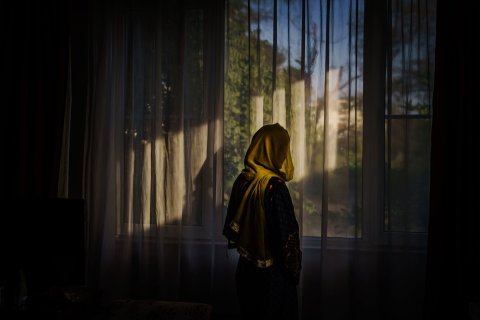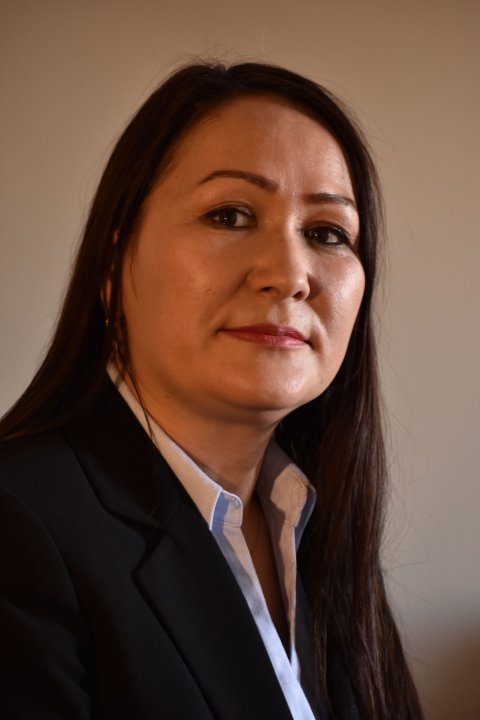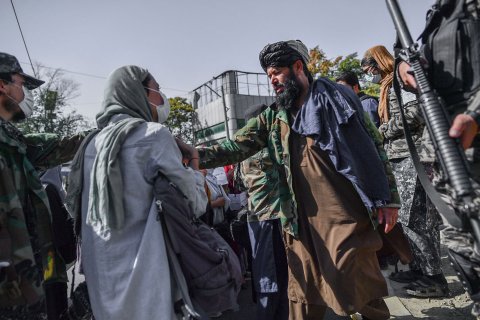Azra Jafari, an Afghan politician and human rights activist, who was the sole woman co-author of the country’s 2003 constitution and in 2008 became her nation’s first female mayor, has watched all this from exile in the U.S. with growing despair. “We were a working democracy for 20 years and during this 20 years we were hopeful,” she tells Newsweek. “Now, we have nothing. What we worked on for 20 years is reduced to nothing.”
Despite an initial public relations push to depict themselves as more moderate than during the 1990s, since retaking power the Taliban have banned women and girls from schools and most workplaces outside their homes. Their dress, speech and movements are tightly restricted. In the worsening economic situation, some poor families have resorted to selling their young daughters into arranged marriages. Arbitrary arrests, disappearances, torture and killings of men and women are widespread. Without an organized pressure campaign from the United States and its allies, Jafari says, nothing will change.
“In Afghanistan, I don’t see any group that could control the Taliban,” she says. “The Taliban will never change their ideologies and the international community needs to make a plan.” So far, she says, there has been nothing substantial from the West, besides statements condemning the crackdown.
In January, António Guterres, United Nations secretary-general, said: “For Afghans, daily life has become a frozen hell.”

Jafari’s family fled Afghanistan during the Soviet occupation, where, as a teenager, she established a school for Afghan refugee children. She returned home after the Taliban’s overthrow and was invited to help form the new government, helping to choose the first president. Five years later, President Hamid Karzai appointed her mayor of the Nili Municipality in central Afghanistan. The move was remarkable not only because she was the first woman to hold such an office, she was also Hazara, a minority ethnic group often persecuted and shut out of political power by Afghanistan’s majority Pashtuns. In April, according to the United Nations, the Taliban tortured and killed a midwife, amputating her legs, stabbing her and shooting her 12 times because she was a woman and a Hazara.
After the fall of the Taliban in 2001, the number of female students and women-owned businesses increased. Twenty-seven percent of the seats in the lower house of Afghanistan’s parliament were reserved for women. The government also constructed over 3,000 health facilities, providing medical care to women who had few services available to them under the Taliban. Childbirth mortality declined and women’s life expectancy jumped from 56 years in 2001 to 66 in 2017, according to the Brookings Institute.
Women’s rights were not equally distributed, with those in urban areas tending to have more freedom than those in the countryside. Across the country, old attitudes about a woman’s place remained deeply rooted. Still, life had changed significantly for the better and Jafari believes the progress would have continued had the Taliban remained sidelined. Now, she says, her fears that women will be “completely shut away from society” appear to be coming true.
Shortly after America’s chaotic departure last August, Taliban officials took a conciliatory public tone. Taliban spokesperson Zabihullah Mujahid spoke of an inclusive regime that was free of discrimination against women, although he was careful to always add “within the framework of Sharia law” or “within our culture framework.”
What that means in practice is that most women are restricted from working, a barrier that’s pushed families reliant on female breadwinners into poverty. Some who are working aren’t being paid properly because of the country’s financial crisis, according to Human Rights Watch. Those who have been able to remain employed must adhere to strict dress code standards or face termination.
In one official statement, the Taliban advised women to simply stay home because the “first and best sign of observing hijab is not to leave the house.” Outside the house, women must cover their faces and, in some parts of the country, must be accompanied by male relatives. Meanwhile, men face fines or jail time if their female relatives violate dress codes, a move that could increase domestic violence in a country where nine out of 10 women experience it, according to the United Nations. In March, reneging on an earlier promise, the Taliban banned girls from schools beyond the sixth grade.
Heather Barr, associate women’s rights director at Human Rights Watch, likened Afghan women to “prisoners in their homes.” She warned in January that the crisis facing women and girls was “escalating with no end in sight” and the Taliban’s policies were depriving the country of one of its “most precious resources.”

(Left) Azra Jafari was named the first woman mayor in Afghanistan’s history in 2008. When the Taliban returned, she escaped to the U.S.COURTESY OF AZRA JAFARI
Afghanistan needs all of its resources now. In the last year, its economy has crumbled. Almost immediately after the Taliban reclaimed power, Western nations froze more than $9 billion in Afghan bank assets. Sanctions on Taliban officials have fueled inflation, and prices of basic staples have soared. Many families have had to sell off the bulk of their possessions to keep their homes; some have sold young daughters into arranged marriages to make ends meet and pay debts.
“As most teenage girls are still not allowed to go back to school, the risk of child marriage is now even higher,” according to Henrietta Fore, former UNICEF executive director. “Education is often the best protection against negative coping mechanisms such as child marriage and child labor.”
Sediqa Rezaei, who worked as a journalist in Kabul until the Taliban takeover last year, has been able to find a job in the Bamyan Province as a social worker for an international organization. But she searched unsuccessfully for a way out of Afghanistan after U.S. troops left and now says she and most of her friends are still looking to emigrate to anywhere they can.
Afghans feel “hopeless,” Rezaei says, because they’ve now learned the Taliban have no intention of changing. Any positive news coming out of Afghanistan, she warns, is just the Taliban trying to curry favor with the global community. “Women are prisoners for the Taliban’s purposes,” Rezaei says. “Of course it will only get worse.”
During Jafari’s six years as mayor, she became known locally as “Mr. Mayor,” a moniker she accepted with pride. Now like Rezaei, who sees international attention shifting to Ukraine, Jafari feels as if the world has turned its back on Afghanistan.
“They all say ‘Oh, it’s a dark situation and we hope it’ll change.’ I have no idea how it’ll change when everyone is silent,” Jafari says.

Although sanctions and the lack of international support for Afghanistan’s economy have been devastating for the Afghan people, Jafari sees them as the world’s most powerful weapons against the Taliban. Afghanistan’s economy is largely dependent on international economic resources, and Jafari is pushing the United States and its allies to use their economic power to further pressure the Taliban to comply with international human rights standards. She’s not optimistic.
“The international community wants to pass whatever’s going on in Afghanistan in silence,” Jafari says. “We still have a lot of activists, journalists, minorities and women in Afghanistan and they live in fear. They need help. Don’t forget about them.”